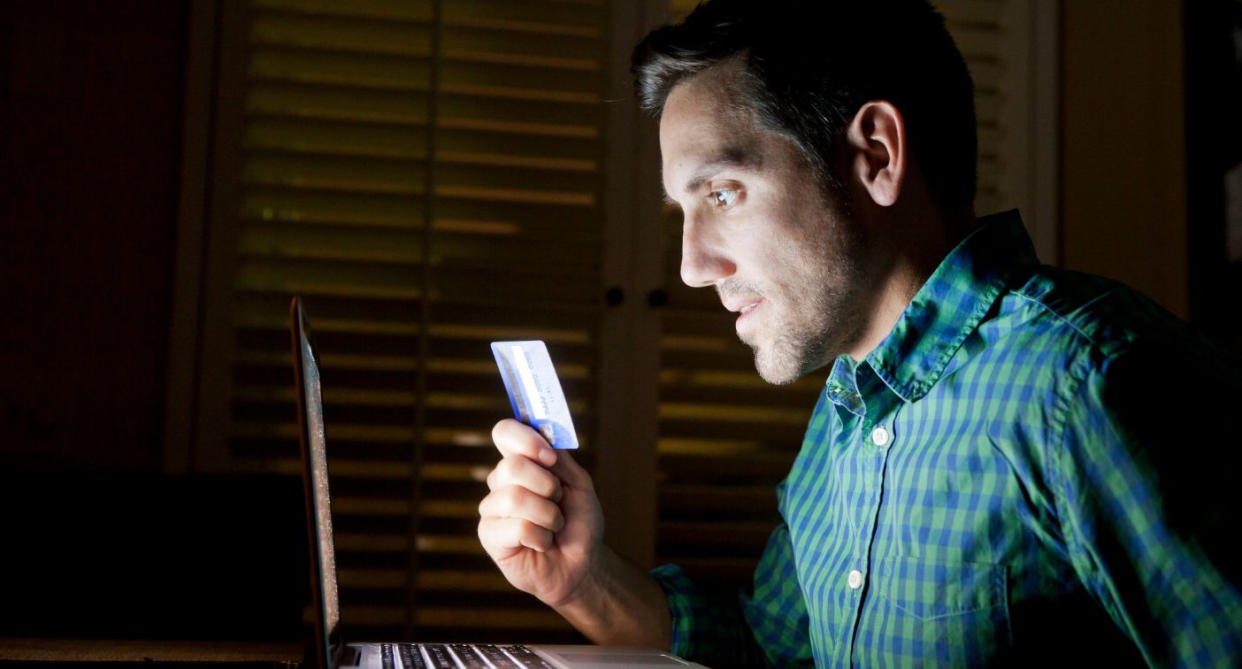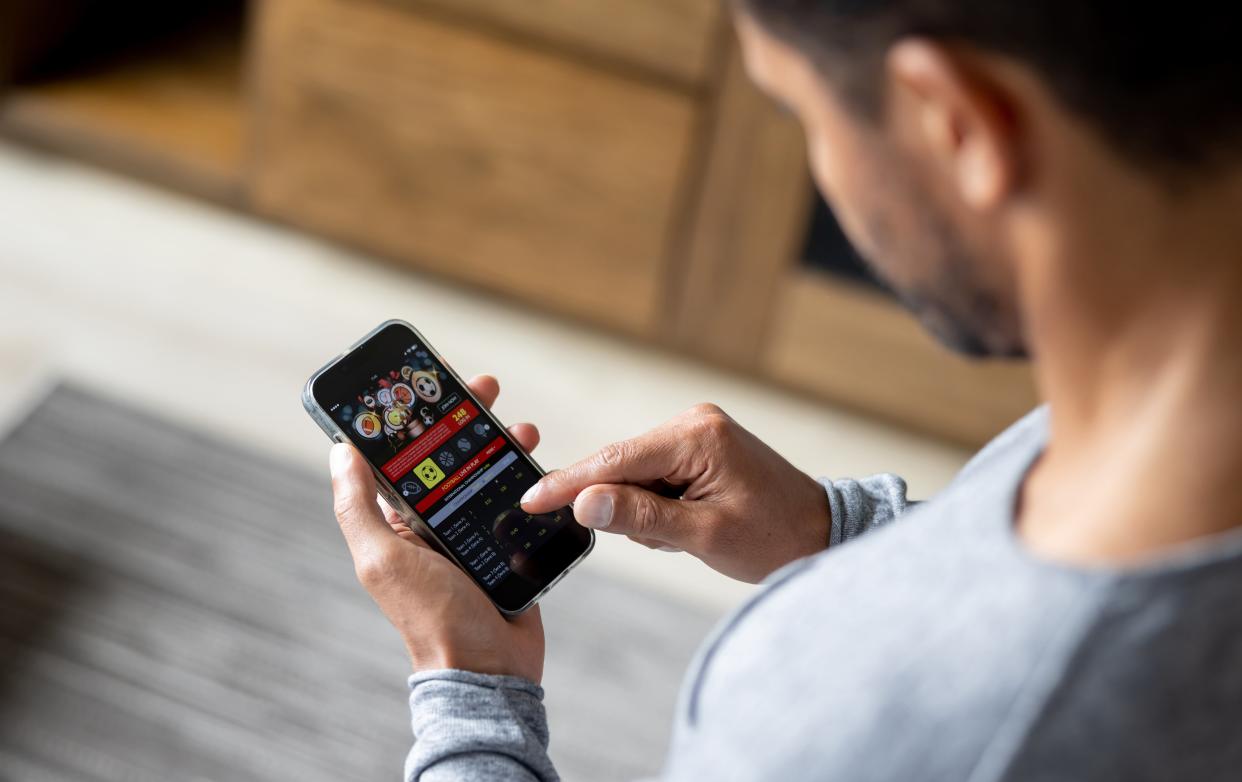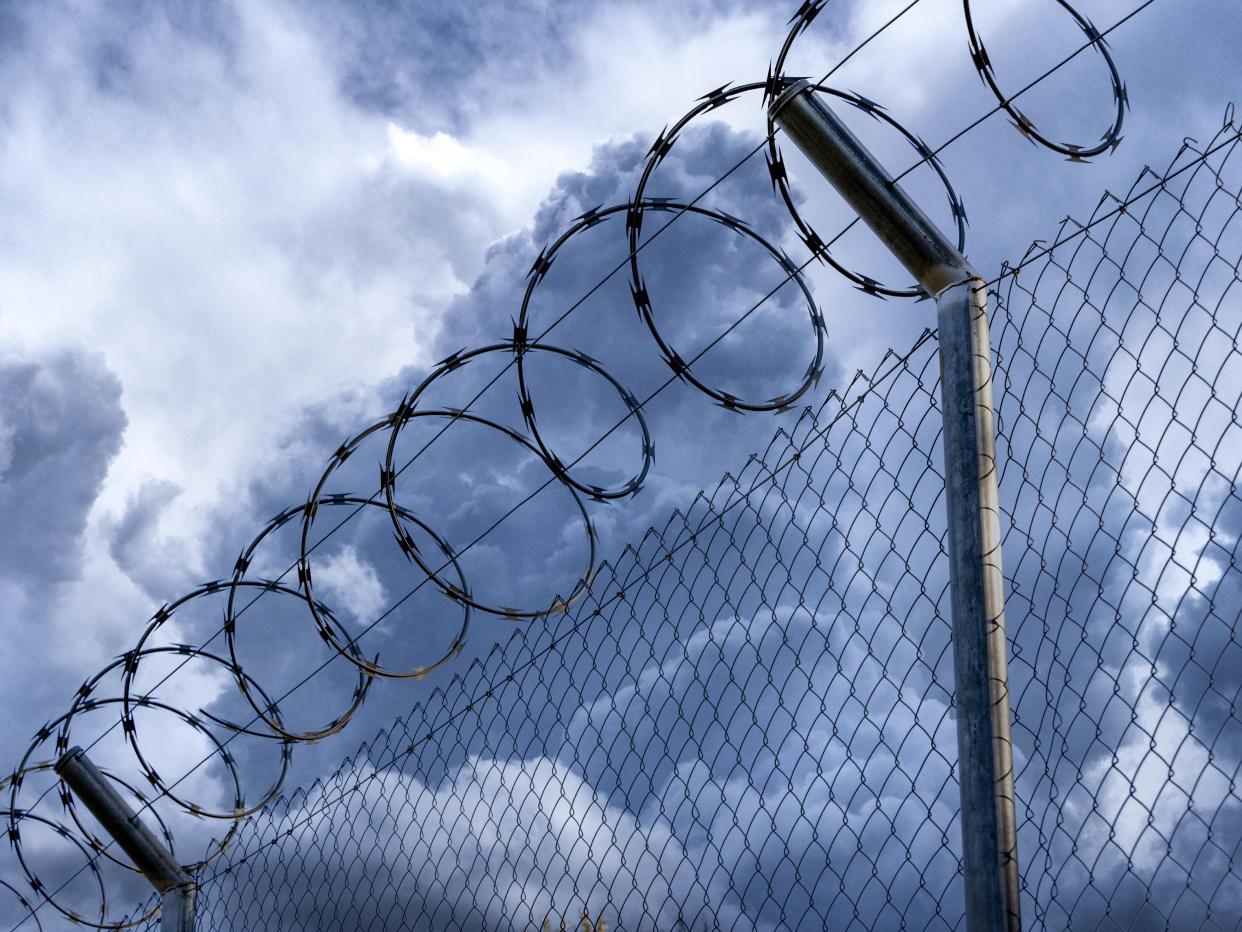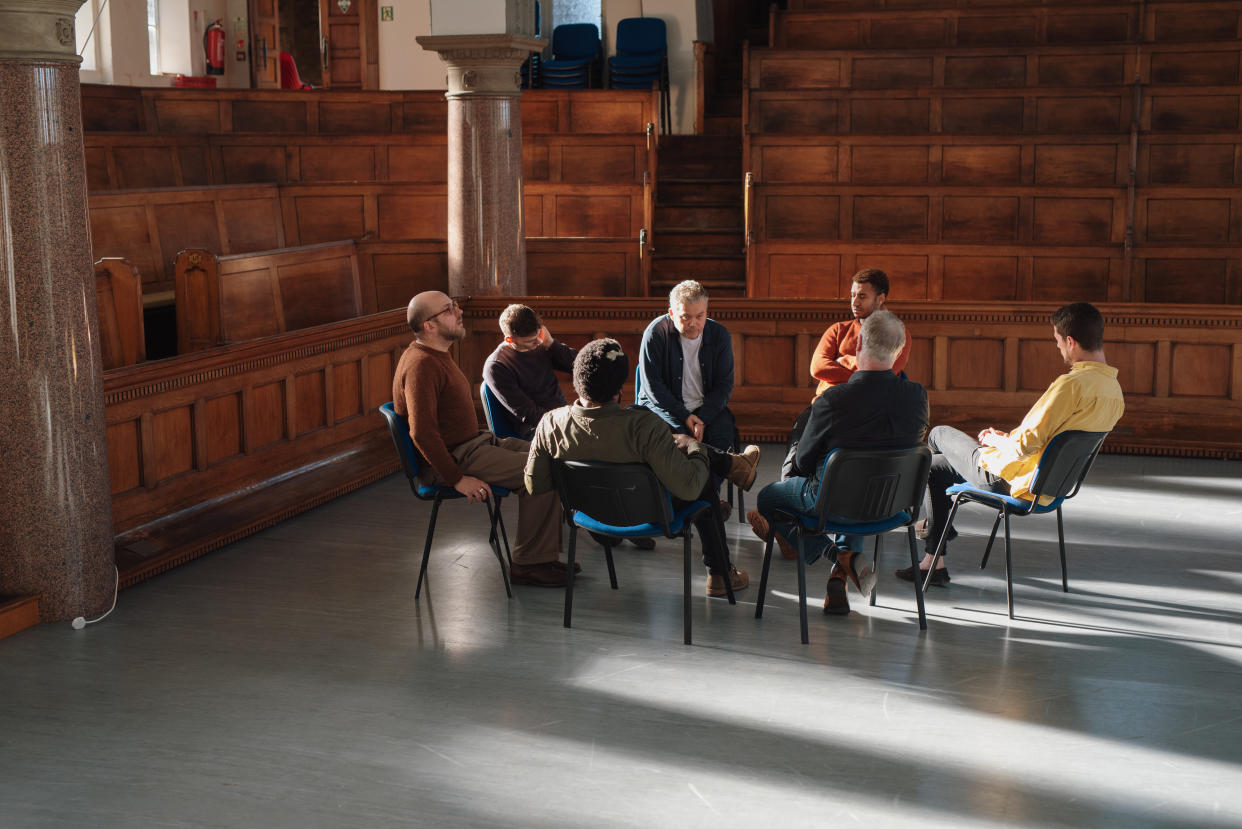I stole from work to fund my extreme gambling addiction
An innocent bet placed on the football when Simon* was 19 quickly spiralled into a crippling gambling addiction. Now 41, he explains how he overcame the devastating obsession that cost him his fiancée, his job and his freedom.

As I watched the football going into the back of the net, I felt completely numb. As always, I’d been certain this was going to be the one – the game and the bet that would give me the big win I’d been waiting for. The one that would finally dig me out of the hole I’d found myself in.
But instead, I’d just lost £20,000 – money that didn’t belong to me; money I should have been using to pay the mortgage on the house my fiancée Kirstie* and I shared. Yet again, I’d lost everything – but I knew it still wouldn’t be enough to stop me stealing more money and gambling it all away.
Eventually, I’d lose £4 million thanks to my gambling addiction, because in my mind, it was never really a gamble. I was convinced I was going to win in the end – when in reality, I was about to lose everything.
The first flutter
I was 19 years old when I placed my first bet. I’d play football with my friends on a Saturday morning, and spend a couple of pounds on an accumulator bet on that day’s matches. After our game, we’d all head to the pub and watch the results come in. Back then, it was a sociable thing – but it wasn’t long before things got out of control.
Bets placed at the bookies turned into online gambling. Small amounts spent at the weekends became larger and larger amounts of money, and I’d gamble 24 hours a day, seven days a week.
My job involved being online at all hours, so my fiancée had no idea what I was doing. She didn’t suspect that gambling consumed my every thought.
I'd wake up and start betting on the Australian greyhounds, then move onto horse racing in the afternoons. In the evenings, I’d bet on football matches around the world, then baseball and American football through the night, before the cycle started all over again.
I had a good job as an accountant, so credit was easy to come by, and bets of hundreds of pounds soon escalated to thousands. My job involved being online at all hours, so my fiancée had no idea what I was doing.
She didn’t suspect that gambling consumed my every thought. Whenever I placed a bet, it felt like time stood still, and I didn’t have to answer to anybody. And of course, I always thought I was the one in control, when that couldn’t have been further from the truth.

An escalating addiction
I’d been gambling for around eight years when I started stealing money from work to fund my addiction. I was certain I’d be able to pay the money back, so it felt like a victimless crime, and it was easy to do as I was in charge of the accounts. To me, it felt justified. Gambling was my number-one priority, and the consequences came second.
I was driven by the fear that if I got caught, my reputation would be destroyed – but more importantly, that I wouldn’t be able to gamble anymore.
One weekend, Kirstie went away on a hen do. When she left on Friday evening, I had £20,000 in my online gambling account. By the next morning, I’d won £64,000, which I decided to withdraw to pay off some of my bills. Instead, by the time Kirstie came home on Sunday, I’d lost the entire amount – plus another £30,000.
If I hadn’t been stealing to fund my addiction, I might have been forced to stop, but with limitless cash at my fingertips I could just keep going, and going, and going. As far as I was concerned I wasn’t hurting anybody, but I was still petrified of getting caught, and learnt to become great at lying to cover my tracks. I’d replace what I stole with winnings and borrow money to cover my bills.
I was driven by the fear that if I got caught, my reputation would be destroyed – but more importantly, that I wouldn’t be able to gamble anymore.
Reaching rock bottom

Four months later, pay day at the organisation I worked for was fast approaching, and I realised there was no money left in the bank for people’s wages. In desperation, I sold my car to raise some money, then gambled it to try and win enough to cover the shortfall. Instead, I lost it.
Although I’d always intended to pay back all the money I’d stolen, it finally dawned on me that I was never going to manage it – and this time, other people were going to suffer because of my actions.
At work, I met up with the board of directors and confessed to stealing over £600,000 from them... The burden of 10 years of lying had finally been lifted off my shoulders.
That Monday, I met up with the board of directors and confessed to stealing over £600,000 from them. They called the police, and I thought I was going to be locked away and never seen again, but I still felt a huge sense of relief. The burden of 10 years of lying had finally been lifted off my shoulders.
While we waited for the police to arrive, I called Kirstie to tell her I was about to be arrested. She was in total shock – I’d covered my tracks so well, she had no idea I was a gambling addict. While I was being questioned, she messaged my mum to tell her I wasn’t welcome back home, so when I was eventually released on bail in the early hours of the morning, I slept on my parents’ living room floor.
I was shocked at being cut out so completely, and disappointed that the person I’d planned to marry wasn’t prepared to support me through my addiction. Kirstie changed the locks to our home and I never saw her again.
Rebuilding my life
Over the next three years, while the police conducted an investigation into my crimes, I was in limbo waiting to be summoned to trial. In the meantime, I began rebuilding my life.
I received counselling for my gambling addiction, got a job at a call centre and met someone new. After a few dates, I realised I really liked her, so I told her about my impending trial. I was incredibly nervous, but she told me she had family members with experience of addiction, so she understood, and agreed to stand by me.
By the time I was finally called to trial and sentenced to six years in jail, we were engaged, and had a four-month-old baby. You might think that’s where my story ends – that I cleaned up my act, overcame my addiction, and built a new life.
Nothing I tried could crack my addiction – even in jail, I set up a gambling ring so I could carry on chasing that high.
But even as I waited for my trial, I carried on placing bets, using credit cards and borrowing money to fund my habit. Nothing I tried could crack my addiction – even in jail, I set up a gambling ring so I could carry on chasing that high. Cash wasn’t allowed inside, but you could work or be sent money by relatives to go towards a weekly shop of items like food and toiletries. Inmates would settle their debts to me by ordering items I wanted that covered the cost when they lost a bet, and vice versa.
When I was released from prison, Julia* and I got married and had another baby, and I started my own business. Then, at last, I reached the epiphany I’d been waiting for. I realised that I’d lost everything before, and if I carried on gambling, it could easily happen again. Only this time, I’d be losing my children as well as Julia, my business and my home.

Reaching out for help
One of the few things I hadn’t tried to help me overcome my addiction was Gamblers Anonymous, so I found a group near me, and decided to give it a go. I expected the people there to be very different from me. But instead, they were from all walks of life and I resonated, in one way or another, with every single person there.
As they shared their experiences and stories, I recognised the lies you tell and the things you do to keep feeding your addiction, and I knew that when I was in that room, I didn’t have to explain myself to anyone. At last, I wasn’t alone.
That was back in January 2023, and since then, I’ve been to Gamblers Anonymous every week without fail – and I haven’t gambled a single penny. It’s the longest period I’ve been without gambling since I was 19, and it’s changed my life.
I no longer live in fear of being found out, or of being unable to pay my bills. I’m more present with my wife and children without the distraction of gambling, and more aware of my feelings and thoughts – and although that’s sometimes hard, it’s worth it. Since joining GA I’ve felt a calmness I’ve never experienced before.

A hidden illness
Gambling addiction is a crippling disease. If you’re addicted to drugs or alcohol, it’s hard to disguise the effects of your illness, and there are only so many drugs and alcohol you can take before you die. But gambling can destroy your world in an hour, and there’s nothing to stop you.
I gambled away millions, but if you’re spending more than you can afford, even if that’s just £100, you’ve got a problem.
I wish I knew what had triggered my addiction, but I honestly have no idea. I simply liked escaping into my own world – a secret hobby that was just for me, and which nobody else knew about. While I was gambling, I was in control, and didn’t have to answer to anybody, which kept me coming back.
Being addicted isn’t about how much you’re spending. I gambled away millions, but if you’re spending more than you can afford, even if that’s just £100, you’ve got a problem.
I’ve experienced this addiction as bad as it gets, but now I’ve got my own business, and I’m married with two wonderful children. I’m telling my story to let other people know that no matter how bad you think things are, there’s hope out there for you too.
Find your local Gamblers Anonymous meeting at Gamblersanonymous.org.uk.
*Names have been changed to protect identities.


